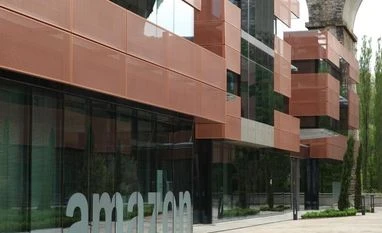On a sunny day in July, commuters arriving at Union Station, in the shadow of Capitol Hill, were greeted with free bananas passed out by Amazon employees. In a Senate building, lawmakers and their aides attended policy panels on how Amazon manages privacy on its Echo devices and how sales for small businesses are booming on its online store.
The day was capped off with a cocktail reception hosted by Amazon's chief spokesman, Jay Carney — the former press secretary to President Obama.
The public relations and lobbying push represents a new face for Amazon in Washington. Facing greater scepticism about its growing power over retail, including from President Trump, Amazon is following the well-worn path of oil, pharmaceutical and even other large tech companies, which try to bend policy in their favour by enhancing connections with federal officials.
Amazon is sweeping the nation's capital with a branding campaign of jobs creation and support for small businesses, promoting the upsides of its major expansion in media, groceries and transportation. This year, Amazon has increased its lobbying staff to 83 members from 60, making it one of the biggest corporate lobbying shops in town. The company is also on its way to surpassing its previous high for lobbying spending: $11.3 million last year. The $6.2 million Amazon spent in the first two quarters of this year was the 11th most among companies, above Exxon and far above Walmart, which spent $3.6 million in the same period.
The company's more aggressive approach, focused on building relationships with leading politicians and improving the company's overall reputation, is a break from its past. Before last year, the company relied on a no-frills operation for more than a decade, prodding officials in Washington on narrow laws and regulations and arguing about the nuances of issues like sales taxes and copyright.
The efforts may not directly apply to an imminent bill or regulation, but they allow the company to steer policy conversations that may be important to Amazon in the future. Amazon is hosting events for lawmakers, like the day of events in July, and holding discussions on transportation and labour policies for congressional staff and policy makers at its sleek offices near Capitol Hill. Speaker Paul D Ryan and other political leaders have visited Amazon's fulfillment centers in their home districts, where Amazon talks up the thousands of jobs those warehouses support.
Amazon's strategic shift has happened as politicians are getting bolder in their criticism about the size and influence of big tech companies. Republicans and Democrats alike have focused on issues including antitrust, privacy and public disclosure.
Many of the harshest attacks have been directed at Facebook and Google, which also have robust lobbying arms in Washington. But Amazon has attracted its own set of vocal critics, who say the company's push into groceries, fashion, transportation and other industries threatens competition. President Trump has lashed out at the company and Jeff Bezos, the company's chief executive, multiple times, accusing the company of avoiding taxes among other things. The company has said it follows all tax laws and has supported a bill that would force online commerce sites to collect sales taxes.
"The concentration of power in the hands of a few companies has the potential to hurt the economy and consumers in the long run," said Representative David Cicilline, a Rhode Island Democrat who is the ranking member of the subcommittee that oversees antitrust matters. He raised concerns over Amazon's $13.4 billion purchase of Whole Foods over the summer, noting that antitrust laws may need an update to account for the power internet companies have over the economy.
Amazon, which declined to comment for this article, has said that its online retail business makes up a minority of all commerce and that it is producing tens of thousands of jobs in regions that have long been in decline. The company had 180,000 full-time employees in the United States at the end of 2016, nearly double its head count five years earlier. The company has said those gains help make up for the job losses from struggling brick-and-mortar retailers.
In the span of a few weeks this summer, Linda McMahon, head of the Small Business Administration, visited Amazon's headquarters in Seattle, where the company had small retailers on hand to talk about how Amazon had helped their businesses. Senator Richard J Durbin, Democrat of Illinois, attended the opening of a new fulfillment centre in Edwardsville, Ill. And Senator Rob Portman, a Republican, visited a new fulfillment centre in his home state of Ohio.
"Got to meet some of the 3,000+ Ohioans employed at this plant. #Jobs," Portman wrote on Twitter at the time.
"They are doing all this reputation stuff around how it is creating jobs and that's helped it generate a lot of media attention," said Stacy Mitchell, co-director of Institute for Local Self Reliance, a nonprofit group that promotes community economic development. Last year, her organisation published a paper that argued the company was making it harder for smaller retailers to make money from selling on Amazon.
Amazon has also decided in recent years to spend more money in the broader influence ecosystem of Washington. In 2016, Amazon gave more than $10,000 each to 66 think tanks, lobbying groups and political organisations. More than a dozen organisations were new to its sponsorship roster, like the Congressional Hispanic Caucus Foundation and the conservative Law & Economic Centre at George Mason University.
©2017 The New York Times News Service
Unlock 30+ premium stories daily hand-picked by our editors, across devices on browser and app.
Pick your 5 favourite companies, get a daily email with all news updates on them.
Full access to our intuitive epaper - clip, save, share articles from any device; newspaper archives from 2006.
Preferential invites to Business Standard events.
Curated newsletters on markets, personal finance, policy & politics, start-ups, technology, and more.
)